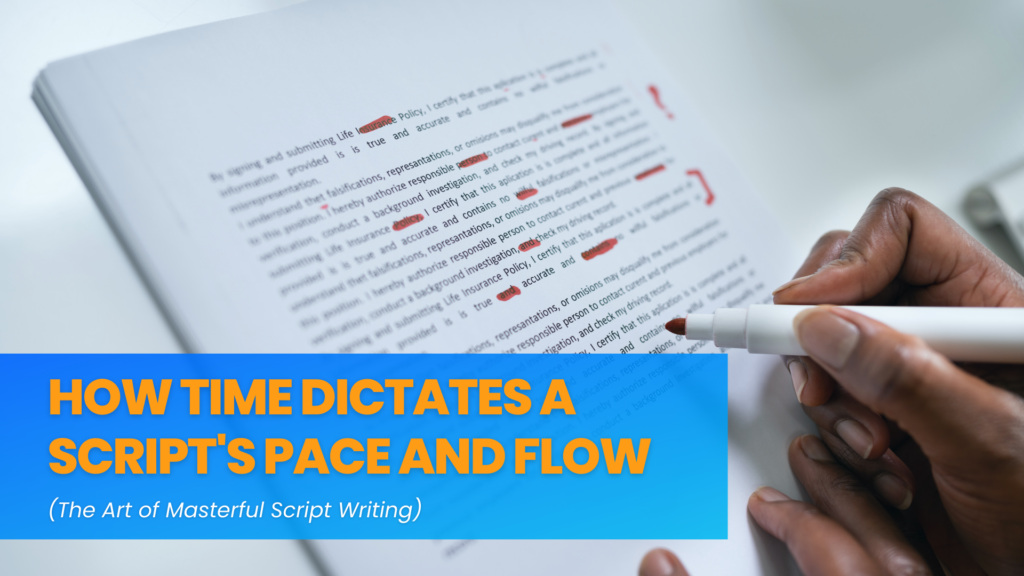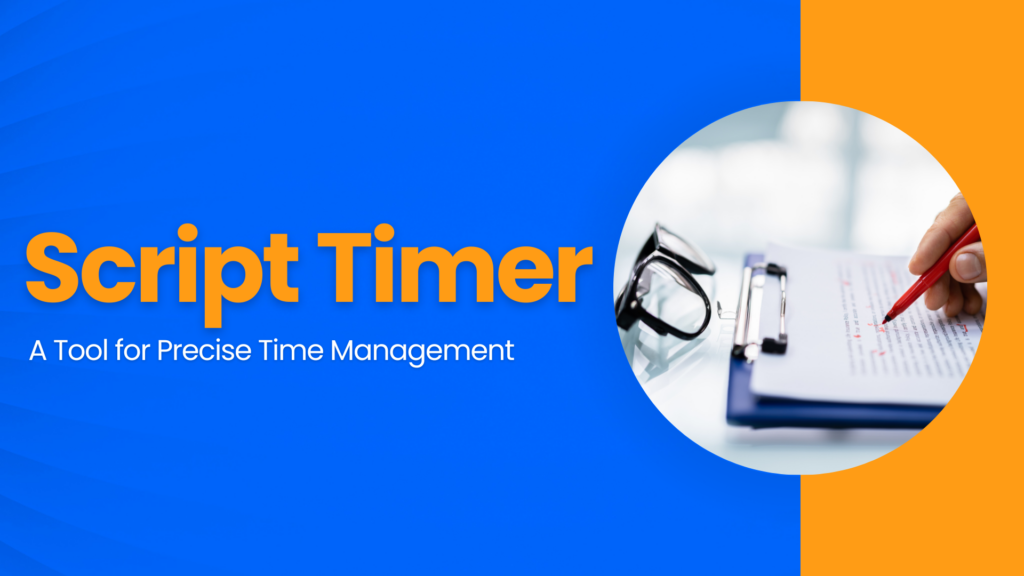Scriptwriting isn’t just about words on a page; it’s about rhythm, pacing, and the artful management of time. Whether you’re crafting a 30-second ad or a two-hour film, understanding how time influences the tempo of your narrative is crucial. Dive into this enlightening journey where we uncover the role of time in your scripts and offer five invaluable concepts that promise to revolutionize your scriptwriting process.
1. The Metronome of Script Writing: Establishing Rhythm
Just as a metronome sets the beat for a musician, time sets the rhythm for a script. Consider a heart-pounding chase scene. Short, sharp sentences mimic rapid breaths, while longer passages provide a sense of drawn-out tension. But how do you know how long a piece of text will take to read out loud?
For that, turn to resources like Script Writing Advanced Strategies that provide tools and insights to gauge the reading duration of your script passages.
2. Real-life Parallels: How We Perceive Time in Stories
A critical aspect of script writing involves mirroring real-life perceptions of time. Think about those moments when time seemingly “flies by” or, conversely, drags on endlessly. Your script should emulate these feelings. A dialogue-filled coffee shop scene might span 10 minutes of real-time, but it feels like mere moments because of the engaging content.
3. Pace Variations: The Ebb and Flow of Script Writing
Ever noticed how some movies keep you on the edge of your seat while others let you relax and reflect? This is due to pace variations. Intense action sequences, emotional confrontations, or thrilling mysteries accelerate the script’s pace, while introspective monologues or serene landscapes slow things down.
For more on this, I highly recommend checking out our post on Perfecting Your Script’s Timing and Pacing with Script Timer. It provides a deeper dive into the art of manipulating time in your narrative.
4. Script Writing with SEO in Mind
Now, you might wonder, how does SEO fit into the scriptwriting landscape? Well, if you’re creating content for the web, SEO is crucial. Search engine optimization ensures your scripts (or related content) are easily found by your target audience. Tools like a script timer not only aid in setting your script’s pace but also play a role in your website and SEO strategy. To understand more about this intertwining relationship, don’t miss our informative piece on the Role of the Script Timer in Your Website and SEO.
5. Keeping the Audience Hooked: The Temporal Cliffhanger
Finally, the beauty of playing with time is that it can leave your audience eagerly wanting more. Cliffhangers at the end of TV show episodes are a prime example. Just when a revelation is about to occur, the screen fades to black, making viewers wait, their anticipation mounting. This manipulation of time is one of the most potent tools in script writing, creating engagement and ensuring your audience returns for the next installment.
6. Breathing Spaces: The Importance of Pauses in Script Writing
Pauses are to scripts what rests are to music: essential. They give the audience time to digest, emote, and anticipate. In the realm of scriptwriting, it’s crucial to strategically place pauses to let a moment sink in or to build tension. It might be the silent aftermath of a shocking revelation or a breath taken before a pivotal decision. Pauses are a scriptwriter’s silent weapon, bringing depth and texture to the narrative.
7. The Golden Ratio: Balancing Action with Dialogue
In script writing, balance is crucial. Action drives the plot forward while dialogue provides depth and reveals character nuances. But how much of each should you include? There isn’t a one-size-fits-all answer, but a well-balanced script often interweaves action and dialogue, ensuring neither dominates for too long. It’s this balancing act that ensures your narrative maintains a consistent pace, holding your audience’s attention from start to finish.
8. Flashbacks and Flashforwards: Time Travel in Script Writing
Scripts aren’t bound by the linear progression of time. Flashbacks transport us to the past, providing context or revealing a hidden memory, while flashforwards propel us into the future, often teasing a possible outcome. But tread carefully. These time-traveling tools, when overused, can confuse and disrupt the script’s flow. However, when wielded with precision, they can enrich the narrative, adding layers of depth and intrigue.
9. Setting the Stage: How Environments Impact Time Perception
Ever noticed how time seems to fly in a bustling city but drags in the quiet countryside? Environments, with their unique atmospheres, influence our perception of time. When scriptwriting, be conscious of the settings you create. A tense scene in a claustrophobic room might feel longer than it is, while an exhilarating chase on busy streets might seem to zip by in an instant.
For a deeper understanding of setting and pacing, our post on Estimating Reading Time from Word Count: The Magic of a Script Timer is a must-read.
10. Evolution of Time: Adapting to Modern Audience’s Consumption Patterns
In this digital age, the consumption patterns of audiences are evolving. With the advent of short video platforms and increasing screen times, scriptwriting now also caters to micro-moments and super-short narratives. But regardless of length, the essence remains: how can you make every second count? Be it a 10-second advert or a sprawling epic, understanding, and mastering time’s role is paramount.
Wrapping Up
Time is the silent orchestrator of narratives, and as scriptwriters, harnessing its power is our foremost challenge and reward. With tools and insights from platforms like Script Timer and a keen understanding of the principles outlined above, you’re well on your way to crafting stories that not only stand the test of time but also redefine it. Embrace the dance, and let time be your partner in the waltz of script writing.
Three Things you can do to keep fast track of your learning:
- Connect on Linkedin as I share valuable lessons weekly.
- Fast track your learning: Get the 6 Steps plus 15 years of Hollywood and Agency experience in one Workshop and masterclass.
- Use the template: 18 Scripts that Sell (also included in every Script-Timer plan.)





